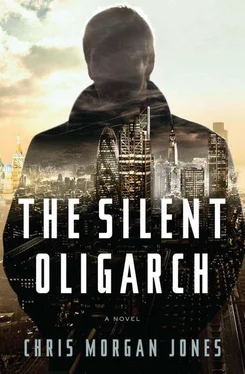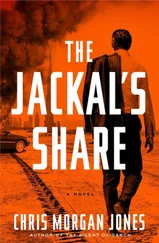“I’m fine. Things are good.”
“So no change?”
“Marina, come on.”
“Why don’t you move to London? I don’t miss Moscow. I’m ashamed to say it but I don’t. Not at all. You could be freer here.”
“It won’t work. You know that. He needs me where he can see me.”
“You know, I used to think Konstantin was the most wonderful man in the world. Like my father but more serious. Committed. I don’t understand what he’s become.”
Lock did not reply.
“What if you find a replacement?” said Marina. “For yourself?”
“What, put an ad in Kommersant ? Monkey wanted for oligarch? Must be quiet and domesticated?”
“Please, Richard, don’t.”
Lock sighed and rested his head in his hands, rubbing his temples. “I’m sorry. I’m sorry. I’ve sometimes thought the same myself. It won’t work.”
“But Dmitry managed it. Nina sent me an e-mail in the spring. They’re in Berlin and they’re happy. It’s like a new life.”
“Dmitry was different.” Lock shook his head. “He’d only been there for what—four years? Five? And Konstantin always preferred Grachev in any case. Part of the problem is he still likes me. But in the end we’ve been together too long. The balloon’s too high.”
Marina looked at him closely. Her silence meant that she didn’t concede that he was right but wouldn’t press her point. He was grateful to her for it.
Before he left, Lock read to Vika, lying next to her on her pink bed. He wondered whether he was making a good job of it: he wasn’t sure he was expressive enough. He was no actor. The book was about a Palestinian girl who longed to play football for her country; it seemed very grown up. It was cool in Vika’s room, and safe, and he wanted to fall asleep next to her and never leave.
By the time he said good-bye to Marina it was almost night outside; from the landing he could see the oaks in the park full and black against the dark blue of the sky.
“Look,” he said. “You’re right. Sod the lawyers. Let’s go away at the weekend. We could go to that place in Bath. The three of us.”
Marina crossed her arms. “No, Richard. That’s too much.”
“Vika would love it.”
“Until she came home.” She shook her head. “It isn’t right. And anyway she has dance on Saturdays.”
Lock’s smile was disappointed. He put his hands in his pockets and looked down, turning slightly as if to leave.
“You should come,” said Marina. “To watch her dance. She loves it.”
“When is it?”
“It’s at ten. Near the school.”
“On Saturday?”
“Saturday. It would mean more to her. Really.”
Lock nodded. He kissed Marina on the cheek, just once, and left.
THE NEXT DAY KESLER, in gray pinstripe, sat at the table, looking grave. Lock was eating a Bryson Joyce biscuit, sitting back in his chair, his right ankle resting on his left leg, his foot tapping impatiently in space.
He had spent the morning instructing a firm of investigators to take Tourna’s affairs apart. Kesler had decided that he should maintain a distance, and Lock had gone alone. He had used the firm before and was reassured by its air of secrecy and menace; rather Muscovite, he thought. It even had a portmanteau name that had a Russian ring: InvestSol Ltd.—Investigative Solutions. There were three partners: one had worked for MI5, one for Special Branch, and the other came with no obvious pedigree. Their office, in a large seventies block somewhere in Victoria, had the air of a slightly under-funded government department. All three partners had been present this morning, no doubt sensing a big assignment. Lock had told them what he wanted and they hadn’t told him much at all, but he knew that soon Tourna’s bank accounts, phone records, credit card statements, dustbins and medical history would be sifted through for signs of anything that looked like ammunition. When he got back to Moscow he would ask the Russians to look into Tourna’s Russian profile, perhaps see what they could get from Greek intelligence. He wasn’t sure the Londoners were up to that.
And now he was in an office on the twenty-first floor of a building near Moorgate, answering the many questions that Kesler was reading from a prepared list. There seemed to be several sheets and they were still on the first.
“So who ultimately owns Faringdon? Ultimately?” Kesler was looking down at his notes, searching them as if for an answer he knew was not there. Griffin, the associate, was to Kesler’s left, and another junior lawyer sat beyond him; Lock hadn’t caught his name. They were all taking notes.
“We’ve been through this,” said Lock.
“We have, and I apologize, but if I don’t understand it I can’t defend you, and at the moment I don’t.”
Lock breathed in deeply and let it out again, almost a sigh. As a lawyer himself he had always enjoyed telling other lawyers what to do, and over the years he had gotten used to it. He didn’t like this reversal, but more particularly he didn’t like to imagine the reasons for it. He wondered where Emily was. Was it Emily? Emma? On his previous visits, Kesler had always been accompanied by a pretty junior lawyer. Her absence no doubt indicated a shift in his status.
“I don’t really feel like the client here, Skip.”
“With respect, Richard, you’re not my client.”
“Faringdon’s your client. Whose signature’s on the engagement letter?”
“Yes. And my duty is to Faringdon, not necessarily to you—to the board and not the shareholder, to be precise.” Kesler held Lock’s eye for a moment. He looked over at his colleagues. “Lawrence, David, can you give us a moment?” Griffin hesitated. “Leave your things. Thank you.”
Griffin and the junior left the room with the air of schoolboys who aren’t sure what they have done wrong.
“Look,” Kesler said, staring hard at Lock, his palms open on the table, “leaving aside legal niceties, can we agree that our interests are aligned? What works for you works for Faringdon and that works for Konstantin. For now. We both know that you don’t own Faringdon and we both know who does. The world knows it. Tourna definitely knows it. But I have to know what lies between, because I have to know how likely Tourna is to prove that.”
“I’ve told you everything to a certain point. If it becomes necessary I can tell you more.”
Kesler looked at his watch. Now he was emphatic. “Richard, we’ve been talking for barely an hour. In Paris you’re likely to be on the stand for a day or two at least. Do you think their QC will get bored and just stop? Thank you very much, Mr. Lock, I think that will do? He will be much less nice than me. Much less. Now, we’ll be coaching you for that, but in the meantime,” slowly now, each word stressed, “you need to open up.”
“Konstantin has nothing to worry about,” said Lock airily, with a small wave of his hand. He wasn’t sure whether this communicated the right air of unconcern. He didn’t trust Kesler; or, more precisely, he didn’t trust what Kesler had been asked to do.
“I know, Richard. OK, I see. Christ.” Kesler looked down at his notes, resting his forehead on his hand, then slowly back to Lock. “Let me reassure you. I’m not here to conduct an audit. I’m not here to inspect the quality of your work and tell him to get a new man to plug the holes. You’ve had a big job to do for Malin but you are not the boss, and you don’t get to decide what to tell me. It’s already been decided.”
So he was no longer the client. Malin and Kesler were talking directly. That wasn’t surprising—he knew that much from the meeting in Théoule—but he had still expected to play a role.
There was a time, Lock thought, when I wasn’t this constricted, when my first response wouldn’t have been colored by fear. He asked himself what his old self would do now. Leave with a humiliating put-down to Kesler? Hire new lawyers? His old self would have had choices. But now, as Kesler had correctly identified, he was as frightened of Malin as he was of the law, and not to cooperate with Kesler was to invite the fury of both.
Читать дальше












